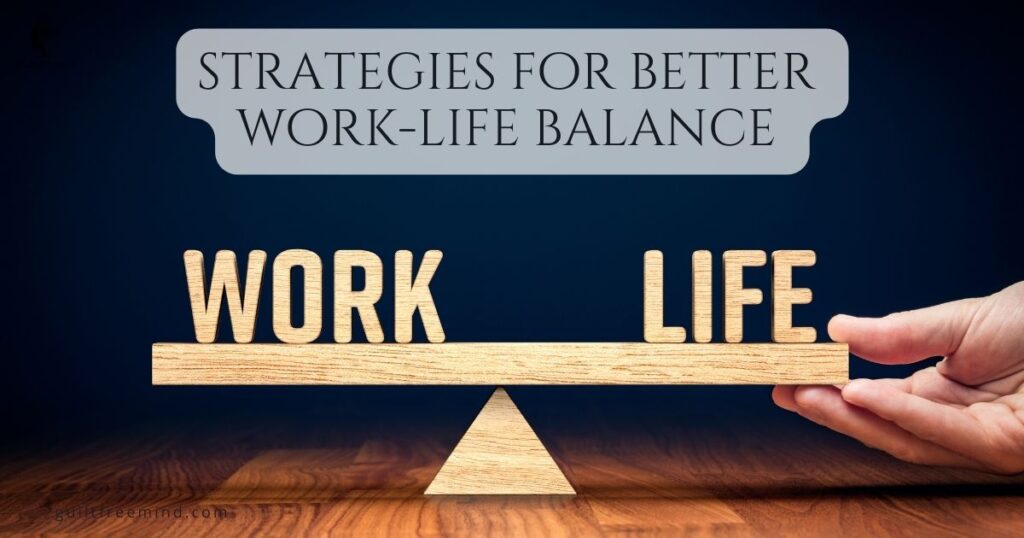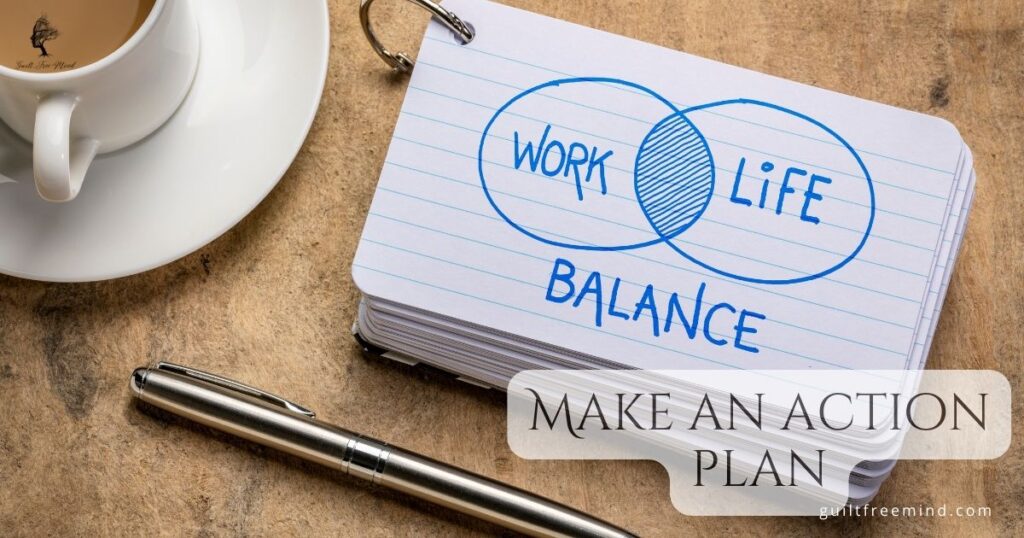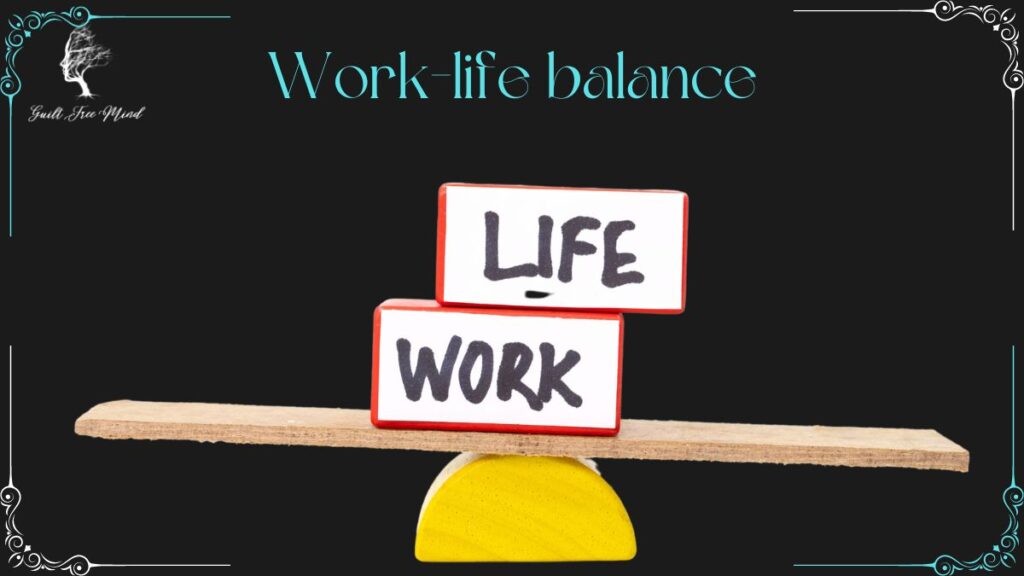Today, we are living in a stress-loaded cocoon. It has become very difficult to maintain a balance between work and personal life. Work-life balance is about maintaining your energy and time between your work and interpersonal relationships. When you have a proper work-life balance, you have enough time for your hobbies, self-care, and personal relationships while also doing well in your work life.
In this article, I will discuss what is a work-life balance, the importance of the same, and finally, how to maintain a proper work-life balance. If you wish to lead a more positive and fulfilling life, subscribe to Guilt Free Mind. The subscription option is present in the sidebar. If you like watching videos, subscribe to the YouTube channel of Guilt Free Mind. Ensure that you ring the notification bill and set it to ALL so that YouTube can notify you about the new video releases the moment they are live on the channel
Table of Contents
What is work-life balance?
When people talk about work-life balance most people think that it’s about dividing time between personal life and breaks. However, it is about much more than that. Work-life balance focuses on finding harmony in both domains. With a proper work-life balance, you express less stress, more job satisfaction, better well-being, and more harmony in your relationships with loved ones.

Our relentless pursuit of aims and dreams without properly handling interpersonal relationships can lead to fatigue, burnout, and a serious negative impact on mental and physical health. However, if you put more emphasis on your home life, it can cause hindrance to your financial stability, growth, and career achievements.
To strike a proper work-life balance, you must learn to recognize your values, priorities, and boundaries. Properly setting your goals, effectively managing the time, and learning to say NO are crucial aspects. Two other key components to focus on are flexibility and adaptability.
Importance of maintaining a work-life balance
In today’s, fast-paced world, maintaining a work-life balance is crucial. You must know how to divide your time and energy between personal life and work-related activities. Having a good balance is crucial for many reasons:
Physical and mental well-being
Maintaining a work-life balance is crucial for your well-being and health. If you constantly neglect your work for your personal life or vice versa, it will cause burnout, stress, and anxiety. Being under severe stress all the time can hurt your cardiovascular health, immune system, and finally, mental health, leading to various health problems.
Boosts efficiency and productivity
An individual who has rested well and is emotionally fulfilled will be more efficient and productive at work. When you have the time to engage in your favorite activities and recharge properly, you can go to your work with better creativity and focus.
Enhanced relationships
When you have a proper work-life balance, it allows you to invest in and nurture your relationship with your friends and family. Having strong social connections is crucial for happiness, support, and overall satisfaction in your life.

Reduction in absenteeism and turnover
When employers and those in positions of authority promote work-life balance, it reduces absenteeism and improper turnover rates. A company that respects the personal time of their employees and promotes flexibility has higher employee loyalty.
Positive work culture
Studies have shown that workplaces that promote work-life balance amongst their employees, foster a culture of positivity and support. The word-of-mouth promotion of the company, in turn, attracts employees with high talent and boosts the engagement and morale of the employees.
Growth and professional development
Focussing on your hobbies and personal interests when you are out of your workplace, will boost your growth and personal development. Such experiences provide you with skills, insights, and new perspectives that can come in extremely handy at your workplace.
Better prioritization and time management
When you strive for a good work-life balance, you also focus on time management and task prioritization. Such people learn which task to focus on first when delegation is key to getting the work done, and finally, how to stop wasting their time on frivolous activities.
Preparing for your future generations
When you focus on your work-life balance, you promote this culture in your kids as well. Your kids learn that they should prioritize their well-being and ensure that they have a healthy work-life balance once they start working too.
Innovation and creativity
Taking time away from work is not a bad thing. When you take some time away, your mind can reset and recharge. It is not unheard of that creative thoughts and ideas emerge when the mind is not completely focused on a task. During your leisure time, your consciousness is not focused on the problem task. However, your subconscious is still processing the problem in the background. It keeps checking different options and finds which option fits the solution best.
Long-term satisfaction at work
with a proper work-life balance, you can stay at your job for longer periods and achieve long-term career satisfaction. When you achieve harmony between your professional and personal lives, you have a higher chance of feeling fulfilled in your career.
Understanding work-life balance
You can only achieve work-life balance when you understand it properly. As I mentioned before, work-life balance refers to maintaining an equilibrium between your work commitments and personal lives. When you strike the right balance between the two, you can not only meet your work obligations, you also nurture healthy relationships outside of your workplace.
Key aspects to focus on to achieve work-life balance
Defining the priorities
The first and foremost aspect to focus on when attempting to achieve a work-life balance is the identification and prioritization of what’s important to you. This involves understanding your personal and professional goals and finding out how they complement one another.
Integration and boundaries
Having boundaries does not mean that there will be a strict separation between the two. You have to learn how to integrate both aspects in a manner that boosts overall fulfillment. The line between the two is flexible but you have to decide where to draw it for ample benefits.
Quality vs Quantity
When it comes to work and personal life, along with the number of hours you allocate to each, you also have to understand if those allocated hours are bringing you the results you wish for. Even if it’s one hour, you must learn to fully immerse and engage yourself in the work you are doing, whether personal or professional.
Flexibility
Flexibility and adaptability are crucial for a proper work-life balance. When you are adaptable and open-minded about changing your plans and schedules, it will help you maintain balance when times become challenging.
Support and communication

When you communicate effectively with your bosses, family members, and colleagues, you encompass the support you will need during challenging times. Having support from your loved ones and colleagues will help you be in a compassionate and understanding environment where you can give your 100%.
Preventing overcommitment
Overcommitment is one of the primary things that lead to exhaustion and stress and a total disturbance of work-life balance. When you set realistic expectations and say NO when needed, you give yourself plenty of time to accomplish work and maintain a proper balance between your work and home life.
Recognizing the signs of imbalance
You cannot fix it if you do not know what needs to be fixed. You need to know the signs of imbalance. In case your personal or professional life starts to weigh down on you, you need to take proactive steps to get back in control.
Continuous adjustment and assessment
Maintaining your work-life balance is a constant process. It requires you to regularly evaluate and adjust your goals and priorities. As the circumstances in your life change and new challenges come into the picture, your priorities shift and you must reassess and adapt.
Are you facing problems in your work-life balance?
To identify if the balance between your personal life and work is out of hand, you should keep assessing your work-life situation. This way, the moment things go out of hand, you can take steps to get them back on track. There is a step-by-step method to identify when it’s time to work on your work-life balance.
Check your priorities
Take some time off your work and personal life to decide what are your priorities in life. Identify your personal goals, core values, and what things or activities bring you fulfillment and joy. Once you have your priorities aligned, you can use it as a guide to plan your work-life balance.
Focus on your current schedule
Find out what your current schedule of activities looks like on a usual day or week. List out all your leisure tasks, work-related activities, and finally, your commitments. Find out the trends that may be affecting your work-life balance.
Check for signs of imbalance
You must be honest with yourself about this. Check if you are feeling stressed, overwhelmed, constantly anxious, neglecting your interests and hobbies, or neglecting your loved ones due to the stress of work.
Focus on your work environment
Check your workplace culture. Focus on the expectations put on you by your boss. Check if you have enough room to breathe, like remote work options, working hours flexibility, and colleague support to allow you to maintain a healthy work-life balance.

Check your personal life
Is there anything in your personal life that is hindering your work life, for example: childcare, health issues, family responsibilities, etc.? Identify these factors and make a list of them.
Check your stress levels
The next aspect to focus on is your stress levels. A little bit of stress boosts one’s work efficiency. However, if you are under severe levels of stress, it can negatively impact both your work and personal life.
Evaluate how much time you spend on technology
Find out how much time you are spending on digital devices like computers and smartphones. Check for the time spent on the devices for both work and personal obligations. Excessive screen time can negatively impact your work and personal life.
Ask your loved ones
You are not the only one who is facing the struggle of work-life balance. Your loved ones may also have faced the issue. They can provide you with tips and tricks about how you can better manage both your work and life.
Check your emotional situation
Focus on your mood and emotions. How have you been feeling lately? Are you feeling overworked, stressed, anxious, or facing any other stress indications due to work pressure or due to personal life? On the other hand, are you feeling content in your personal life situation?
Set your priorities and goals
First, conduct your assessment about when and on what work you have to spend more or less time. Once your priorities are decided, focus on what changes you need to make to gain a balance between your life and work.
Time to make an action plan
Once you have figured out your priorities, design an action plan. Make sure that your plan is realistic and achievable. Break down your large goals into smaller, easily achievable tasks. Next, set deadlines to achieve your goals. Ensure that your planner also has spaces and time for your leisure activities.
Seek resources and support
If you need support, do not hesitate to reach out. Whether it is your boss, colleague, family, friends, or spouse, talk to them. Discuss what options you have and how can you better manage your time. Most companies have policies and resources in place that can help you on this journey.
Be patient and flexible
As I mentioned above, striving for a work-life balance is a continuous thing. It requires you to be flexible, patient, and ready to implement changes when needed. Also, remember to celebrate your small victories along the way.
Strategies to establish and maintain work-life balance
Work-life balance is different for every individual. There are no clear lines. You are the only one who can define the boundaries between the two. You have to find a way so that both aspects of your life blend seamlessly into one another and enhance your well-being and productivity. The timings between the two need not be absolutely strict and unbending. It is about finding a flexible option that works for you. Here are some strategies to strike a balance between your work and personal life:
Set crystal clear goals
Decide on your personal and professional goals. As I mentioned before, the first step is identifying your aim and what are you working towards. Once you have defined your goals, you get a unified vision for your life. This integration pattern allows you to focus on important tasks and reduces the conflict between your commitments and work.

Flexible work options
Find out if your workplace supports flexible work hours. Do you have a remote work option or job-sharing? If these options are available, you can better accommodate your responsibilities of personal life without sacrificing your work tasks.
Combination of personal activities and work
Find out opportunities where you can blend your work and personal life and get more done in a short period. For example: you can use your lunch break to get some exercise in or time your work calls when you are out on your walks and engage in your hobbies during your breaks.
Make use of technology
Use technology wisely. Technology has many options that you can use to boost your productivity like various productivity tools, communication tools, calendar apps, and planners that can allow you to seamlessly move between your personal and work tasks.
Set realistic expectations
Understand your limits. Make sure you don’t put up more tasks on your lists than you can handle. First, find out how much you can do in a day and plan accordingly. This way you won’t end up overcommitting and missing out on both personal and work responsibilities.
Focus on being mindful
Being mindful is crucial. When you are mindful, you are more present in the current scenario. Try being mindful all the time. Whether you are spending time with your loved ones or during your work time, try being engaged at the moment. It will take time for this to work. However, you should keep going till you get into the habit. This will go a long way in reducing your stress and boosting focus.
Involve your friends and family
Support is crucial. Start involving your family and friends in your personal life and work, when possible and appropriate. Share your wins and low points with your family and friends. Their understanding can go a long way in helping you find a better work-life balance.
Focus on yourself
Prioritize your self-care tasks. Ensure that your leisure and self-care activities are crucial parts of your everyday routine. Make sure that you regularly engage in tasks that rejuvenate and recharge you daily.
Learn the art of disconnection
Let your time work and leisure every day. Boundaries are crucial for a proper work-life balance. When your work time is over, disconnect from your work devices change your focus towards your personal life, and immerse yourself in your life’s other aspects.
Focus on the results, not the hours you spend working.
Instead of focusing on the number of hours you spend working, focus on the tasks you have to finish. Work on understanding the achievements and outcomes. This shift of focus allows you to be more productive and achieve more in a limited time.

Conclusion
Work-life balance is crucial for everyone. Whether you work from the office or home, improper work-life balance can disrupt your productivity and well-being. In this article, I explored the importance of maintaining a proper work-life balance and how to achieve harmony between the two. You must understand, that work-life balance is a personal journey that is constantly changing and needs to be adjusted as per your changing needs.
Are you looking to boost your productivity and perform better at your work and personal life? If your answer is yes, you should subscribe to Guilt Free Mind. The subscription option is present in the sidebar. If you like watching videos, subscribe to the YouTube channel of Guilt Free Mind. Remember to ring the notification bell and set it to ALL. If you have any queries about this blog post or any other on Guilt Free Mind, feel free to leave them in the comment section, I will be happy to help.
See you in my next blog post
Dr. Shruti
Frequently Asked Questions
Work-life balance focuses on reaching an equilibrium between one’s personal life and work. This involves finding ways to efficiently manage your time between work and leisure. A good work-life balance boosts job satisfaction, increases productivity, and improves a person’s overall well-being.
There is no set pattern for work-life balance. Everyone’s work-life balance looks different. A proper work-life balance involves setting proper balance, prioritizing self-care, and finally, finding ways to properly manage stress. A good work-life balance allows you to feel satisfied in your personal and professional life.
Work-life balance evolves by putting in proper work arrangements, like remote work options, flexible hours, disconnecting from work when work time is over, and focusing on self-care. Make use of technology to ensure better communication and commitment. This will let you be more efficient at work, stress management, and self-care.
